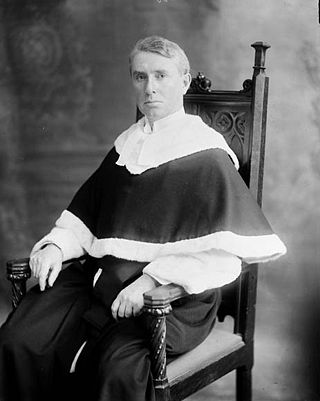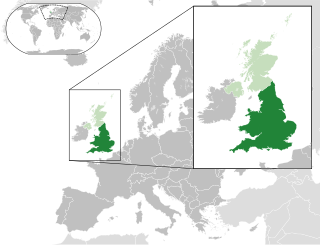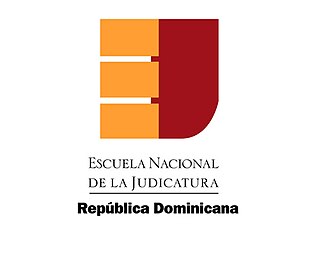Politics in Estonia takes place in a framework of a parliamentary representative democratic republic, whereby the Prime Minister of Estonia is the head of government, and of a multi-party system. Legislative power is vested in the Estonian parliament. Executive power is exercised by the government, which is led by the prime minister. The judiciary is independent of the executive and the legislature. Estonia is a member of the United Nations, the European Union, and NATO.
Chancellor is a title of various official positions in the governments of many nations. The original chancellors were the cancellarii of Roman courts of justice—ushers, who sat at the cancelli or lattice work screens of a basilica or law court, which separated the judge and counsel from the audience. A chancellor's office is called a chancellery or chancery. The word is now used in the titles of many various officers in various settings. Nowadays the term is most often used to describe:

The term magistrate is used in a variety of systems of governments and laws to refer to a civilian officer who administers the law. In ancient Rome, a magistratus was one of the highest ranking government officers, and possessed both judicial and executive powers. In other parts of the world, such as China, a magistrate was responsible for administration over a particular geographic area. Today, in some jurisdictions, a magistrate is a judicial officer who hears cases in a lower court, and typically deals with more minor or preliminary matters. In other jurisdictions, magistrates are typically trained volunteers appointed to deal with criminal and civil matters in their local areas.

The American Bar Association (ABA) is a voluntary bar association of lawyers and law students; it is not specific to any jurisdiction in the United States. Founded in 1878, the ABA's stated activities are the setting of academic standards for law schools, and the formulation of model ethical codes related to the legal profession. As of fiscal year 2017, the ABA had 194,000 dues-paying members, constituting approximately 14.4% of American attorneys. In 1979, half of all lawyers in the U.S. were members of the ABA. The organization's national headquarters are in Chicago, Illinois, and it also maintains a significant branch office in Washington, D.C.

The Chartered Institute of Management Accountants (CIMA) is the global professional management accounting body based out of the UK. CIMA offers training and qualification in management accountancy and related subjects. It is focused on accountants working in the industry and provides ongoing support and training for members.

The Confederation of British Industry(CBI) is a British business interest group, which says it represents 190,000 businesses. The CBI has been described by the Financial Times as "Britain's biggest business lobby group". Incorporated by royal charter, its mission is to promote the conditions in which businesses of all sizes and sectors in the UK can compete and prosper for the benefit of all. In 2023, the association was shaken by numerous accusations of sexual misconduct in the organisation.
Custos rotulorum is a civic post that is recognised in the United Kingdom and in Jamaica.

The New Zealand Law Society is the parent body for barristers and solicitors in New Zealand. It was established in 1869, and regulates all lawyers practising in New Zealand. Membership of the society is voluntary, although any person wishing to practice law in New Zealand must obtain a practising certificate from the society. The society has 13 branch offices throughout the country. Each branch has a president and a council, which represent their members’ interests on a regional and national level.

There are various levels of judiciary in England and Wales—different types of courts have different styles of judges. They also form a strict hierarchy of importance, in line with the order of the courts in which they sit, so that judges of the Court of Appeal of England and Wales are generally given more weight than district judges sitting in county courts and magistrates' courts. On 1 April 2020 there were 3,174 judges in post in England and Wales. Some judges with United Kingdom-wide jurisdiction also sit in England and Wales, particularly Justices of the United Kingdom Supreme Court and members of the tribunals judiciary.

The judiciary of Portugal is a system of courts that together constitute one of the four organs of Sovereignty as defined by the Portuguese Constitution. The courts are independent from the other three Portuguese organs of Sovereignty.

Pi Gamma Mu or ΠΓΜ is the oldest and preeminent honor society in the social sciences. It is also the only interdisciplinary social science honor society. It serves the various social science disciplines which seek to understand and explain human behavior and social relationships as well as their concomitant problems and issues. Pi Gamma Mu's constitution defines the social sciences to include the disciplines of history, political science, sociology, anthropology, economics, psychology, international relations, criminal justice, social work, social philosophy, history of education, and human geography. Membership is also extended to interdisciplinary social science fields that build on the core social science disciplines, such as business administration, education, cultural and area studies, public administration, and organizational behavior.

The Alabama State Bar is the integrated (mandatory) bar association of the U.S. state of Alabama.

The Rhode Island Bar Association is the unified (mandatory) bar association of the U.S. state of Rhode Island.

The Judges' Council is a body in England and Wales that, representing the judiciary, advises the Lord Chief Justice on judicial matters. It has its historical roots in the original Council of the Judges of the Supreme Court, created by the Judicature Act 1873 to oversee the new Supreme Court of Judicature. This body initially met regularly, reforming the procedure used by the circuit courts, and the new High Court of Justice but met less regularly as time went on, meeting only twice between 1900 and 1907, with a gap of ten years between meetings in 1940 and 1950 respectively. After relative inactivity, it was eventually wound up through the Supreme Court Act 1981, which contained no provisions for its continued existence, something Denis Dobson attributes to newer bodies which performed the duties the Council had originally been created to do.

His Majesty's Courts and Tribunals Service (HMCTS) is an executive agency of the Ministry of Justice. It was created on 1 April 2011 by the merger of Her Majesty's Courts Service and the Tribunals Service.
A justices' clerk or clerk to the justices is an official of the magistrates' court in England and Wales whose primary role is to provide legal advice to justices of the peace.
From 1949 to 2005, magistrates' courts committees (MCCs) had overall responsibility for management of the magistrates' courts service within their areas in England and Wales.

In England and Wales, magistrates are trained volunteers, selected from the local community, who deal with a wide range of criminal and civil proceedings. They are also known as Justices of the Peace. In the adult criminal court, magistrates decide on offences which carry up to twelve months in prison, or an unlimited fine. Magistrates also sit in the family court where they help resolve disputes that involve children, and in the youth court which deals with criminal matters involving young people aged 10-17. Established over 650 years ago, the magistracy is a key part of the judiciary of England and Wales, and it is a role underpinned by the principles of 'local justice' and 'justice by one's peers'.

The National Judicial College(ENJ in Spanish) is the body that is responsible for training and ongoing formation of all servers in the Dominican Judiciary. As an educational institution is recognized by the National Council of Higher Education as a Specialized Institute of Higher Studies.
Lieutenant Colonel Sir William Thomas Charles Skyrme was a British civil servant, army officer, and magistrate. He served as Secretary of Commissions in the Lord Chancellor's Office for three decades.












